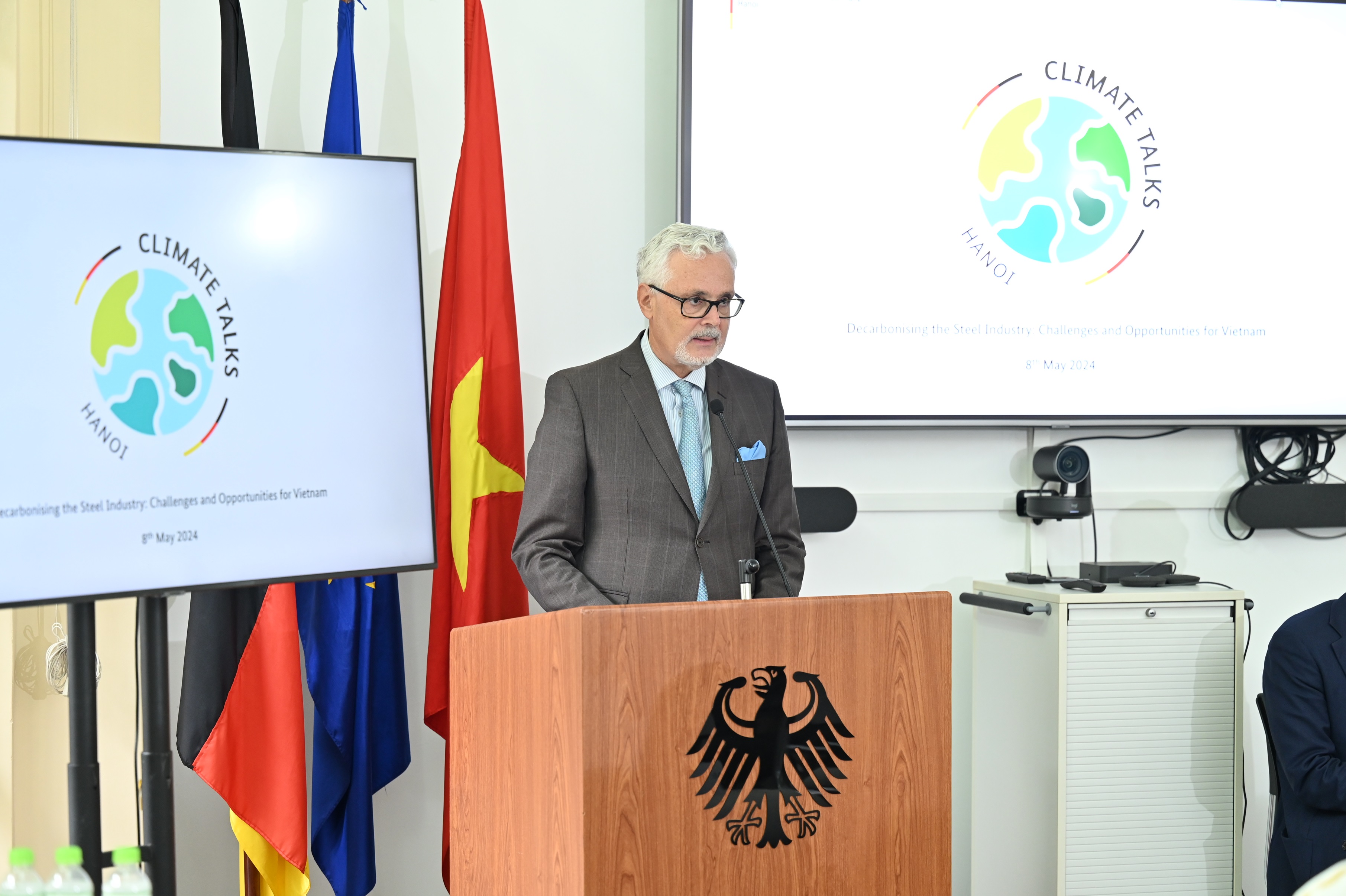The German Embassy in Hanoi on Wednesday hosted the inaugural panel discussion titled ‘Decarbonizing the Steel Industry: Challenges and Opportunities for Vietnam,’ marking the launch of 'Hanoi Climate Talks,’ a new series of events aimed at addressing various climate change-related topics in Vietnam.
‘Hanoi Climate Talks’ provides a platform for exchanging experience, raising awareness, and fostering cooperation between policymakers, businesses, the scientific community, and the broader public, the embassy said in a press release on Wednesday.
The panel discussion attracted the participation of many stakeholders from ministries, industry, and academia such as the Ministry of Industry and Trade, the Ministry of Natural Resources and Environment, the Ministry of Science and Technology, the Vietnam Chamber of Commerce and Industry, the Vietnam Independent Directors Association, the Hanoi University of Science and Technology, members of the diplomatic community, and the private sector.
In his opening speech, Dr. Guido Hildner, German Ambassador to Vietnam, emphasized, “The decision to host ‘Climate Talks’ here in Vietnam is a recognition of Vietnam’s climate ambitions and a testament to the close cooperation between Germany and Vietnam in the field of energy transition.”
“We want to foster exchanges between academia, policymakers, industry and the broader public, and we would like to share our experiences and learn from others.”
Global steel production accounts for at least seven percent of global greenhouse gas emissions. Its carbon footprint touches almost every industry.
Germany’s steel sector is one of the largest emitters of CO2. In Vietnam, the steelmaking industry, which ranks number one in Southeast Asia, remains one of the main contributors to the country’s carbon emissions, said Hildner.
Europe and Germany aim to become frontrunners in the production of low-CO2 steel.
“Our primary objective is to combine prosperity with decarbonization," he stressed.
"We all know that the green transition of heavy industries is a global challenge.
"Therefore, Germany launched the Climate Club during last year’s COP28.
"One of its main objectives is to offer support for developing and emerging economies in their efforts to leapfrog into climate-friendly industrial development.”
In the panel discussion, international experts explored the technological, economic, and policy aspects of transitioning steel production to more sustainable practices.
Steel is one of the world’s most-used materials and a central part of the global economy, thus making it a global priority for decarbonization.
Decarbonizing hard-to-abate sectors such as steel requires the adoption of a range of tools and technologies and mobilizing investment.
Chu Hoang Duc Anh from the Vietnam Industry Agency under the Ministry of Industry and Trade emphasized the need for decarbonization and highlighted national strategies for sustainable transformation aligned with global climate goals.
Prof. Dr. Bui Anh Hoa, lecturer and dead of the materials engineering department at the Hanoi University of Science and Technology, shared insights about the production processes of the steel sector in Vietnam and his analysis of how to decrease carbon emissions in steelmaking under scientific aspects.
Speaking at the discussion, Cécile Seguineaud, industry policy analyst at the OECD Clean Energy Finance and Investment Mobilization program, underscored that high investments are needed in low-carbon technologies to align industry’s growth with countries’ net-zero emission targets.
She spotlighted the importance of assisting emerging and developing economies in designing solutions for financing and improving the enabling conditions that can accelerate the steel industry’s transition.
The panel discussion played a crucial role in singling out the urgent need for decarbonization of heavy-emitting industries and reaffirmed the importance for global climate action.
Considering the steel sector's pivotal role in numerous industries such as construction, manufacturing, mobility, and infrastructure, its projected growth underscores its enduring significance for economic and sustainable development.
Like us on Facebook or follow us on Twitter to get the latest news about Vietnam!
















































